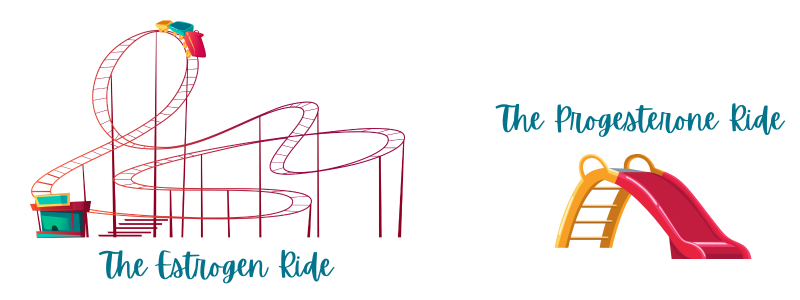The Stages of Menopause
Aug 01, 2025
If you're here, I'm guessing you're noticing some changes and wondering if menopause is the culprit. Here's a fun fact that might surprise you: the word "menopause" gets thrown around to describe this whole messy transition, but technically? Menopause is actually just one moment in time. One moment that takes twelve months to confirm and up to a full decade to reach.
Here's what I want you to know upfront: if you went through puberty with functional ovaries, you will go through menopause. Whether it's part of your natural aging process or kicks in due to surgery or medical intervention, the symptoms you're experiencing aren't just in your head, you don’t have to do this alone, and it IS a big deal.
Ready to understand what's actually happening in your body? Let's break down these three stages so you know exactly where you are and what's coming next.
Menopause Is a Profound Life Change
Here's what every woman needs to understand about this transition:
- This is as significant as puberty and deserves the same level of attention, support, and medical care
- Your experience will be uniquely yours even though there are common patterns and symptoms
- We have more options today than any generation of women before us
This transition is massive. We're talking about hormonal changes that can affect everything from your sleep to your mood to your metabolism. Some days you'll feel like you've got this handled, other days it'll feel like complete chaos. Both are completely normal.
Our bodies are going through a change that's just as profound as puberty, if not more so. The difference? When we were teenagers, everyone expected us to be moody and unpredictable. Now? We're supposed to just push through and pretend everything's fine. Screw that.
Bottom line: This isn't something you have to suffer through in silence anymore. We have significantly more tools and treatment options available to us today than generations past.
Your Journey Starts in Perimenopause
This is where the real party begins, and by party, I mean chaos:
- Perimenopause is the transition phase where your hormones start their dramatic farewell tour
- You can still get pregnant until you've gone 365 consecutive days without any bleeding
- Most symptoms happen during this stage because your hormones are fluctuating significantly while still showing an overall steady decline
Think of your estrogen as being on a roller-coaster filled with lots of hills and sharp curves that get smaller and smaller as you closer to the end of the ride. Meanwhile, progesterone is on a kids ride that is straight downhill and over a lot faster than the adult rides.

The Two Phases of Perimenopause
Most of the hormonal chaos happens during perimenopause, which is why some experts divide it into early and late stages. Early perimenopause usually brings irregular cycles, while late perimenopause has longer and longer gaps between cycles. But honestly, not even that is consistent from person to person.
Symptoms like hot flashes and insomnia can show up at any point and stick around through both phases. Some lucky women even get to keep them as souvenirs well into postmenopause. The key thing to remember is that everyone's experience is different, and there are tools to help make symptoms manageable.
What's Really Happening with Your Hormones
Remember our roller coaster analogy? Estrogen's having a wild ride while progesterone basically does one short ride and heads home early. This creates what's often called "estrogen dominance" in pop-culture (the medical term is unopposed estrogen).
Here's the thing: progesterone is your body's peacekeeper. It's the calming hormone that keeps your cycle on track and helps you sleep. When it bails early, estrogen runs amok without supervision. Many perimenopause symptoms happen because progesterone declines faster than estrogen, so you're dealing with both the overall hormone decline AND the effects of one declining faster than the other.
Signs You've Started the Journey
For many women, the first hint that perimenopause has entered the chat is subtle cycle changes. Your periods might get shorter or longer, heavier or lighter. At first, you might blame stress (which, fair), but once you see consistent variations of more than seven days from your normal cycle, congratulations! You've likely started your menopause journey.
Important reminder: Erratic cycles don't mean you've stopped ovulating. Until you hit that magical 365-day mark without any bleeding, you could still get pregnant. If you're on birth control that stops your cycles, work closely with your doctor to figure out when you've reached menopause, especially if pregnancy isn't on your wish list.
Bottom line: Perimenopause is where the action happens, symptoms are normal, and pregnancy is still possible until proven otherwise.

Menopause: The Moment You've Been Building Toward
Let's clear up the biggest misconceptions about menopause:
- Menopause is one moment in time not a phase you hang out in for months or years
- It's defined as your last menstrual period but takes twelve months to confirm it actually happened
- Average age is 51-52 but earlier or later is completely normal
Technically, you enter menopause after on the last day of your last menstrual cycle. Until that happens, you're in perimenopause. After that, you're in postmenopause. So, menopause itself is more or less one moment that we have to wait twelve months to confirm actually occurred.
Unfortunately, your final cycle doesn't come with a parade, confetti, or even a courtesy text from your ovaries. Clinically, menopause isn't confirmed until you've gone twelve months (365 consecutive days) without a single drop of vaginal bleeding.
And yes, that one random spotting day resets your countdown clock. That said, if any bleeding feels unusual or concerning, don't wait it out. Schedule an appointment with your doctor to discuss your options and get checked out.
When Menopause Happens Differently
The average age for menopause in the United States is 51-52, but your ovaries didn't get the memo about averages. Surgical removal of both ovaries will put you in menopause immediately, regardless of age. Certain medical treatments and conditions can also trigger early menopause or create temporary menopause-like symptoms.
Regardless of what caused your menopause, your experience will be uniquely yours. Whether you had surgery in your 30s that flipped the switch overnight or you gradually transitioned through your 40s, your journey matters and deserves proper support.
Bottom line: Menopause is a moment, not a phase, but it takes a full year of patience to confirm it actually happened.
Postmenopause: Welcome to the Rest of Your Life
Once you've officially reached menopause, welcome to your postmenopause era:
- Most perimenopause symptoms improve significantly or resolve completely during this stage
- Focus shifts from acute symptoms to long-term health and disease prevention
- This stage lasts for the rest of your life so it's worth investing in your health and happiness
For most women, reaching postmenopause brings relief. The hormonal chaos of perimenopause settles down, and many of those frustrating symptoms either disappear or become much more manageable. You might have some lingering issues, but the day-to-day unpredictability is typically behind you.
Now the focus shifts from managing hot flashes and irregular periods to broader health concerns. We're talking about bone health, cognitive function, cardiovascular health, and overall quality of life. Think of it as shifting from crisis management to long-term strategic planning for your health.
The postmenopause experience is just as individual as perimenopause, but generally speaking, this is when you get to reclaim your sense of stability and start planning for all the amazing things you want to do with the rest of your life.
Bottom line: Postmenopause often brings relief from acute symptoms and shifts focus to long-term health and wellness.
Common Symptoms Throughout the Menopause Transition
What you might experience during this journey:
- Over 30 different symptoms are associated with the menopause transition
- Symptoms vary dramatically between individuals and even day to day for the same person
- Hot flashes are common but not universal despite what popular culture suggests
The symptom list for menopause reads like a medical textbook, but here's what I want you to remember: you don't have to experience all of them, or even most of them. Some women sail through with minimal symptoms, others feel like they've been hit by a truck, but most fall somewhere in between.
Common symptoms include irregular periods, hot flashes, night sweats, sleep disturbances, mood changes, brain fog, joint aches, changes in libido, vaginal dryness, weight gain (especially around the middle), and changes in hair and skin. But this is just the highlight reel, there are dozens more.
Bottom line: Symptoms are highly individual and experiencing them doesn't mean you have to suffer through them.
Your Options for Symptom Management
You have more tools in your toolkit than ever before:
- Lifestyle modifications can significantly impact how you experience symptoms
- Hormone therapy is safer than previously thought for most women
- Non-hormonal treatments offer alternatives for those who can't or don't want hormones
The landscape of menopause treatment has changed dramatically in recent years. We now know that hormone therapy, when appropriate, is much safer than the originally reported decades ago. We also have better non-hormonal options and a much deeper understanding of how lifestyle factors influence symptoms.
From nutrition and exercise modifications to stress management techniques, sleep hygiene improvements, and various medical treatments, there's no shortage of approaches to help you feel more like yourself again. The key is finding the right combination that works for your body and your life.
If you want to explore menopause hormone therapy, working with healthcare providers who truly understand menopause can help you navigate these options and create a personalized approach to symptom management. The Menopause Society has a list of doctors that can help you find someone in your area.
Bottom line: You don't have to white-knuckle through this transition, there are evidence-based tools to help you feel better.
Final Thoughts
Here's what I want you to walk away with today: menopause is a profound, normal life stage that deserves proper attention, support, and care. It's not a disease to be cured, but it's also not something you have to suffer through in silence.
The most powerful moment of my own menopause journey came when I stopped accepting dismissive attitudes as acceptable healthcare. I started researching, kept asking questions until I got real answers, and eventually became a coach with multiple certifications in the process. For the first time in years, I felt empowered and in control again.
And dear reader, that's exactly what I want for you.
References:
Qaseem, A., Forciea, M. A., McLean, R. M., & Denberg, T. D. (2015). Menopausal Symptoms: Comparative Effectiveness of Therapies. In Agency for Healthcare Research and Quality (US). https://www.ncbi.nlm.nih.gov/books/NBK285446/





